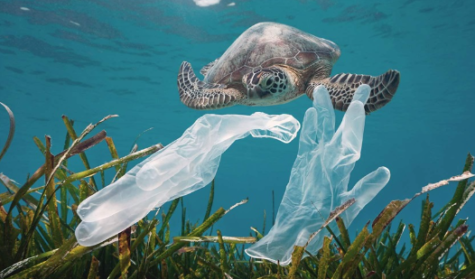The Plastic Crisis, and How to Fix It
Addressing the Often Overlooked Plastics Problem
January 5, 2023
There is no doubt that the state of the environment has been getting worse due to urgent issues such as pollution and climate change. These issues are well-known to most people, but there are many everyday items that significantly contribute to the ongoing environmental crisis. One such everyday item is: plastic.
Plastic is used every single day for both commercial, convenient, and personal use. The material is found in water bottles, lunch trays, to-go boxes from restaurants, food containers, tables, and so much more. Despite its prevalence in society (and the fact that they can be recycled), around 91 percent of plastics are not recycled and disposed of instead (National Geographic, 2018). This number is extremely high, especially considering that 400 million tonnes of plastic waste are produced annually, with 75 to 199 million tonnes in the ocean (UN Environment Programme, n.d.). In the environment, as plastics break down, they release a substantial amount of greenhouse gasses (which contribute to global warming).
In addition, the plastics pose health risks for not only the animals in the affected environments, but also for humans. Plastics can break down into small grains called microplastics, which have been found in tea, salt, milk, seafood, seaweed, and other foods consumed on a daily basis (The Guardian, 2021). Of course, ingesting small pieces of plastic are definitely not healthy.
An immediate remedy that has the potential to have lasting effects is to recycle. Plastic types 1 (PETE), type 2 (HDPE), and 5 (PP) are usually recyclable, while other types may be accepted at certain local recycling centers although not with curbside recycling. Plastic type indications can be found on the vast majority of plastic products. Prior to recycling, it is essential to clean, empty, and dry the plastic product, and to avoid recycling products such as plastic bags and styrofoam products.
The crisis of plastics is not something to be pushed away until the last minute. Our health and the environment depends on the seemingly small actions that could be taken every day.



























































